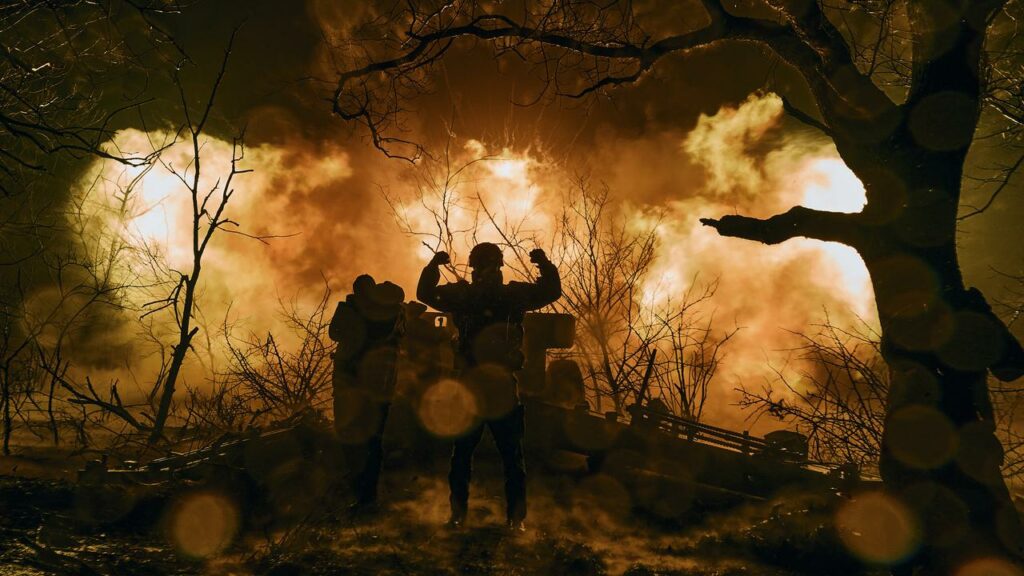Putin open to talks on Ukraine: Kremlin
Anthony Deutsch |

Russian President Vladimir Putin is open to talks on a possible settlement in Ukraine but the West must accept Moscow’s demands, the Kremlin says.
The comments came a day after United States President Joe Biden said he would be willing to speak with Putin about ending the war.
Putting on a united front in talks on Thursday at the White House, Biden and French President Emmanuel Macron said they would hold Russia to account for its actions in Ukraine but the US leader also appeared to hold out an olive branch to Moscow while stressing he saw no sign of any change in Putin’s stance.
Biden has not spoken directly with Putin since Russia invaded Ukraine on February 24.
In March, Biden branded Putin a “butcher” who “cannot stay in power”.
Now, after more than nine months of fighting and with winter tightening its grip, Western countries are trying to boost aid for Ukraine as it reels from Russian missile and drone attacks targeting key energy infrastructure that have left millions without heating, electricity and water.
Fighting is raging in eastern Ukraine, with the town of Bakhmut the main target of Moscow’s artillery attacks, while Russian forces in the southern Kherson and Zaporizhzhia regions remain on the defensive, Ukraine’s General Staff said in its latest battlefield update.
In a bid to reduce the money available for Moscow’s war effort, the European Union tentatively agreed on Thursday on a $US60 ($A88) a barrel price cap on Russian seaborne oil, according to diplomats.
The measure will need to be approved by all EU governments in a written procedure by Friday.
In Moscow’s first public response to Biden’s overture, Kremlin spokesman Dmitry Peskov told reporters: “The president of the Russian Federation has always been, is and remains open to negotiations in order to ensure our interests.”
Peskov said the US refusal to recognise annexed territory in Ukraine as Russian was hindering a search for ways to end the war.
Moscow has previously sought sweeping security guarantees including a reversal of NATO’s eastern enlargement.
Putin has said he has no regrets about launching what he calls a “special military operation” to disarm and “denazify” Ukraine.
He casts the war as a watershed moment when Russia finally stood up to an arrogant West after decades of humiliation following the 1991 fall of the Soviet Union.
Ukraine and the West say Putin has no justification for what they cast as an imperial-style war of occupation in which thousands of civilians have been killed.
Kyiv says it will fight until the last Russian soldier is ejected from its territory.
After their Oval Office talks on Thursday, Biden and Macron said in a joint statement that they were committed to holding Russia to account “for widely documented atrocities and war crimes, committed both by its regular armed forces and by its proxies” in Ukraine.
Biden told reporters he was prepared to speak with Putin “if in fact there is an interest in him deciding he’s looking for a way to end the war”, adding that the Russian leader “hasn’t done that yet”.
Macron said he would continue to talk to Putin to “try to prevent escalation and to get some very concrete results” such as the safety of nuclear plants.
The International Atomic Energy Agency hopes to reach an agreement with Russia and Ukraine to create a protection zone at the Zaporizhzhia nuclear power plant, Europe’s largest, by the end of the year, the head of the UN atomic watchdog, Rafael Grossi, told Italian newspaper La Repubblica in an interview.
Repeated shelling around the Russian-held plant has raised concern about the potential for a grave accident just 500km from the site of the world’s worst nuclear accident, the 1986 Chernobyl disaster.
Russia has recently intensified a campaign to knock out power, water and heat supplies in Ukrainian cities.
Ukraine and the West say the strategy deliberately intends to harm civilians, a war crime, something Moscow denies.
Reuters